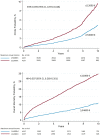Income and outcomes of patients with incident atrial fibrillation
- PMID: 35705362
- PMCID: PMC9279743
- DOI: 10.1136/jech-2022-219190
Income and outcomes of patients with incident atrial fibrillation
Abstract
Background: Socioeconomic disparities can be associated with adverse outcomes in patients with cardiovascular diseases. The impact of personal income on the outcomes of patients with atrial fibrillation (AF) is unclear.
Methods: Nationwide observational registry-based study on patients with incident AF in Finland during 2007-2018.
Results: 203 154 patients (mean age 73.0±13.5; females 49.0%) were diagnosed with incident AF during the study period. Overall, 16 272 (8.0%) patients experienced first-ever ischaemic stroke and 63 420 (31.2%) died (mean follow-up 4.3±3.3 years). After adjusting for confounding factors, low personal income was associated with increased risk of overall mortality in all age strata and the incidence of first-ever stroke in patients aged <65 years and 65-74 years, but not in those ≥75 years. The magnitude of this effect was greatest in patients aged <65 years. After propensity score matching of patients <65 years in the lowest and highest quintiles of maximum personal annual income, at 10 years, those in the highest income quintile (≥€54 000) had significantly lower risk of first-ever stroke (subdistribution HR 0.495, 95% CI 0.391 to 0.628) and overall mortality (HR 0.307, 95% CI 0.269 to 0.351) compared with patients in the lowest income quintile (≤€12 000).
Conclusions: Personal annual income has a significant impact on the incidence of first-ever ischaemic stroke and overall mortality among patients with incident AF, particularly among patients of working age. Low-income indicate the need for intervention strategies to improve outcomes of AF.
Trial registration number: NCT04645537.
Keywords: CARDIOVASCULAR DISEASES; COHORT STUDIES; Health inequalities.
© Author(s) (or their employer(s)) 2022. Re-use permitted under CC BY-NC. No commercial re-use. See rights and permissions. Published by BMJ.
Conflict of interest statement
Competing interests: FB: none. KT: none. JJ: none. OH: none. JP reports personal fees from Boehringer-Ingelheim, personal fees and other from Bayer, grants and personal fees from BMS-Pfizer, personal fees from Portola, other from Amgen, personal fees from Herantis Pharma, personal fees from Terve Media, other from Vital Signum, personal fees from Abbott, outside the submitted work. PM: Consultant: Roche, BMS-Pfizer-alliance, Novartis Finland, Boehringer Ingelheim, MSD Finland. JH: Consultant: Research Janssen R&D; Speaker: Bayer Finland. ML: Speaker: BMSPfizer-alliance, Bayer, Boehringer-Ingelheim. JH: Research grants: The Finnish Foundation for Cardiovascular Research, EU Horizon 2020, EU FP7. Advisory Board Member: BMS-Pfizer-alliance, Novo Nordisk, Amgen. Speaker: Cardiome, Bayer. AA: Research grants: The Finnish Foundation for Cardiovascular Research, Sigrid Juselius Foundation; Speaker: Abbott, Bayer, Boehringer-Ingelheim. JA: Research grants: The Finnish Foundation for Cardiovascular Research; Speaker: Bayer, Pfizer and Boehringer-Ingelheim. Member in the advisory boards: Bayer, Pfizer and AstraZeneca. ML: Consultant: BMS-Pfizer-alliance, Bayer, Boehringer-Ingelheim, and MSD; Speaker: BMS-Pfizer-alliance, Bayer, Boehringer Ingelheim, MSD, Terve Media and Orion Pharma. Research grants: Aarne Koskelo Foundation, The Finnish Foundation for Cardiovascular Research, and Helsinki and Uusimaa Hospital District research fund, Boehringer-Ingelheim.
Figures

References
-
- Dai H, Zhang Q, Much AA, et al. . Global, regional, and national prevalence, incidence, mortality, and risk factors for atrial fibrillation, 1990-2017: results from the global burden of disease study 2017. Eur Heart J Qual Care Clin Outcomes 2021;7:574–82. 10.1093/ehjqcco/qcaa061 - DOI - PMC - PubMed
Associated data
LinkOut - more resources
Full Text Sources
Medical
